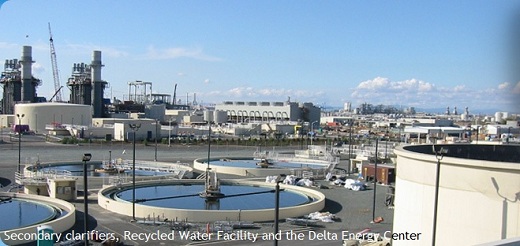Delta Diablo Gets $1M for Biosolids Energy Project
The California Energy Commission today awarded $999,924 for a research project that will look at converting biosolids to energy. Funding comes from the Commission’s Public Interest Energy Research (PIER) program.
“California continues to make significant strides in bioenergy research. By studying how to use biosolids more effectively, California will generate energy from previously untapped waste streams and reduce the volume going into our state’s growing landfills,” said Energy Commission Vice Chair James Boyd.
The Commission approved $999,924 to the Antioch-based Delta Diablo Sanitation District to develop, demonstrate, and implement a system to turn biosolids into energy. The total cost of the project is $4,738,924, with the remainder of costs coming from Intellergy Corporation of Richmond.
Biosolids are the treated byproduct produced by wastewater treatment facilities when organics are removed from municipal sewage. Biosolids contain latent energy that can be harnessed in several ways; one conversion method involves heating the material to break down the solids and create gases that are converted to energy.
Wastewater treatment facilities in California must address how to manage biosolids. Existing options for using biosolids are limited (mainly land application and alternative daily cover in landfills) and face increasing environmental challenges that could eliminate those options. Current disposal practices often involves hauling biosolids long distances, which consumes transportation fuels, increases greenhouse gas emissions, and increases ratepayers’ costs for wastewater treatment.
The Delta Diablo Sanitation District will lead the implementation of a regional biosolids to energy facility under the project that the Energy Commission is funding. The project will demonstrate the steam/carbon dioxide reforming technology of Intellergy which has yet to be commercially demonstrated with biosolids. The biosolids will be heated at a high temperature in an airlock vessel, vaporizing the liquids and gasifying the organic solids. Steam and carbon dioxide will then be added, producing a hydrogen-rich gaseous fuel known as syngas. The hydrogen gas produced will be used to run a fuel cell to generate electricity.
The district is leading the Bay Area Biosolids to Energy Coalition, a collective of 16 San Francisco Bay Area public agencies working on local, sustainable solutions to biosolids management. In 2009, 661,000 dry metric tons of biosolids were generated in California. More than 158,000 dry metric tons of biosolids are produced in the Bay Area annually.
The Public Interest Energy Research (PIER) program supports public interest research and development that helps improve the quality of life in California by bringing environmentally safe, reliable, and affordable energy services and products to the marketplace. For more information, visit www.energy.ca.gov/research/.
Created by the California Legislature in 1974, the California Energy Commission is the state’s primary energy policy and planning agency. The Energy Commission has five major responsibilities: forecasting future energy needs and keeping historical energy data; licensing thermal power plants 50 megawatts or larger; promoting energy efficiency through appliance and building standards; developing energy technologies and supporting renewable energy; and planning for and directing state response to energy emergency.
the attachments to this post:

Delta Diablo Sanitation District 2


























